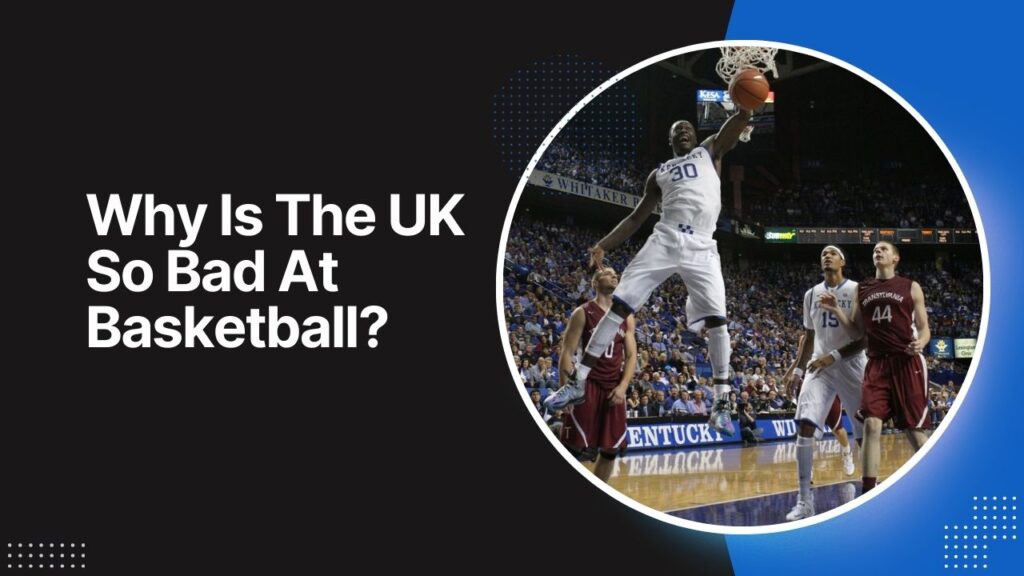Why Is The UK So Bad At Basketball? The UK’s lack of basketball success is often attributed to limited funding and low cultural interest compared to sports like soccer.
Basketball is one of the most popular sports worldwide, captivating audiences from the United States to China and beyond.
Major leagues, like the NBA, have created global fan bases, and many European nations have developed highly competitive leagues that produce world-class talent.
However, despite the global appeal of the game, the UK has struggled to make a mark in basketball. [Why Is The UK So Bad At Basketball?]
This lack of success often puzzles fans and analysts, especially considering that British athletes and sports leagues typically perform well in many other sports, like football, rugby, and tennis.
So, what makes basketball an exception? This article explores the reasons behind the limited success and popularity of basketball in the UK and looks at what steps could be taken to elevate the sport.
What Is the State of Basketball in the UK?
In the UK, basketball remains a fringe sport rather than a national pastime. The British Basketball League (BBL), the top professional league, struggles to attract significant fan engagement or media coverage, which hampers its ability to generate revenue and draw in elite talent.
Although there is a niche following for basketball in the UK, the sport lacks the mass appeal seen in other European nations and the United States. [Why Is The UK So Bad At Basketball?]
Comparatively, British sports fans rally behind football, rugby, cricket, and even tennis with far more enthusiasm. Football stadiums are packed weekly, and major cricket and rugby events draw millions of viewers.
Basketball, on the other hand, occupies a much smaller slice of the sports landscape. Many British fans, if they follow basketball at all, are more likely to support NBA teams rather than local British teams.
With limited support and exposure, British basketball faces an uphill battle to grow in both popularity and competitiveness.
5 Key Reasons Why the UK Struggles with Basketball
1. Funding and Investment Challenges
One of the major obstacles hindering the growth of basketball in the UK is the lack of sufficient funding and investment.
The British government, private sponsors, and even the media devote far more resources to sports like football and rugby.
The disparity in funding means that basketball leagues and teams often lack the financial support necessary to develop talent, expand infrastructure, and enhance player facilities.
Many basketball clubs in the UK operate on tight budgets, making it challenging to attract and retain skilled players and coaches. [Why Is The UK So Bad At Basketball?]
Funding issues impact the sport at all levels. Professional players often receive relatively low wages, which deters potential athletes from pursuing basketball as a career.
Furthermore, without substantial investment, basketball teams can’t afford to market themselves effectively or offer exciting fan experiences, which are critical for building a loyal following.
In contrast, football clubs in the UK benefit from multimillion-dollar sponsorship deals, substantial government support, and a powerful fan-driven economy, creating a stark contrast in available resources.
2. Low Cultural Emphasis on Basketball
In the UK, sports like football and rugby are deeply ingrained in the culture, while basketball is relatively overlooked.
Football, in particular, is a national passion, with a longstanding tradition of rivalries, regional loyalty, and a massive fan base.
The media and public attention given to these sports leaves little room for basketball to grow in the UK. [Why Is The UK So Bad At Basketball?]
Football teams attract a level of support that transcends regional loyalties, whereas basketball struggles to gather the same level of cultural significance.
The lack of cultural emphasis on basketball affects the sport’s visibility. UK basketball games rarely receive prime television slots, and news coverage is minimal compared to that for football or rugby.
Without significant media coverage, it becomes challenging to create awareness or spark widespread interest in the sport. [Why Is The UK So Bad At Basketball?]
Consequently, basketball remains on the periphery of British sports culture, lacking the fervent fan base seen in other parts of Europe or the U.S.
3. Inadequate Grassroots Development
Grassroots development is vital for any sport’s growth, as it introduces young players to the game and builds a foundation of talent for the future.
In the UK, however, there are far fewer opportunities for young athletes to engage with basketball compared to more popular sports.
Schools and community programs often prioritize football, rugby, and cricket, leaving basketball with limited support. [Why Is The UK So Bad At Basketball?]
For a young athlete to pursue basketball, they often face challenges in finding quality coaching, local clubs, and accessible facilities.
The lack of organized grassroots programs has a trickle-down effect on the overall talent pool. Without early exposure to the sport, many potentially talented players never consider basketball seriously, choosing other sports instead.
In the U.S., by contrast, basketball is embedded in the school system, from middle schools to high schools and colleges, providing a steady stream of skilled players.
The UK, lacking similar structures, misses out on nurturing young talent and building a pipeline for professional leagues.
4. Few Professional Opportunities
Another major issue for UK basketball is the lack of professional opportunities within the country. [Why Is The UK So Bad At Basketball?]
Unlike countries with strong domestic leagues that can support players through their entire careers, the UK’s league structure offers fewer professional outlets.
The British Basketball League (BBL) struggles to compete with the high-profile leagues in countries like Spain, France, and Italy. [Why Is The UK So Bad At Basketball?]
Young British players who aspire to play professionally often need to move abroad to pursue their careers, resulting in a “brain drain” that weakens the domestic talent pool.
When talented players leave the UK to play in more competitive European leagues, they gain valuable experience but do little to elevate the sport back home.
This trend creates a vicious cycle in which the UK struggles to retain top talent, making it difficult for the British Basketball League to become more competitive and attract better players and coaches.
Additionally, British players who succeed abroad often lack the visibility needed to inspire young players at home, further reducing the sport’s impact domestically.
5. Geographical and Institutional Constraints
Basketball in the UK also suffers from geographical and institutional constraints. Compared to more popular sports, there are fewer basketball facilities and courts available for training and community games.
Many clubs and organizations face challenges with limited budgets and a scarcity of resources, resulting in a lack of training infrastructure. [Why Is The UK So Bad At Basketball?]
While football has dedicated stadiums, expansive fields, and high-quality facilities, basketball often contends with limited indoor court availability.
Institutional support for basketball is also minimal. Without substantial backing from local governments, schools, and community organizations, basketball teams and clubs struggle to create a strong foundation.
The result is that aspiring players lack access to proper training environments and resources, making it harder to develop their skills and achieve professional success.
Comparison with Successful European Basketball Nations
While basketball lags behind in the UK, other European nations have successfully fostered basketball cultures and developed strong leagues.
Spain, for instance, has Liga ACB, one of the strongest domestic leagues globally, producing NBA stars like Pau Gasol, Ricky Rubio, and Luka Dončić.
France, similarly, has invested in youth programs and competitive leagues that nurture talent from an early age. [Why Is The UK So Bad At Basketball?]
These nations have established basketball as a significant sport within their cultures, creating a fan base and infrastructure that supports the growth of the sport.
The success of Spain and France can be attributed to their comprehensive development programs and significant government and private sector investment.
Youth academies and community programs allow aspiring players to receive professional coaching and compete at high levels from a young age. [Why Is The UK So Bad At Basketball?]
For the UK to emulate this success, it would need to adopt similar initiatives, encouraging young talent through organized programs and investing in leagues to make them more attractive to players and fans alike.
What Would It Take for UK Basketball to Improve?
Revitalizing basketball in the UK requires a multifaceted approach that addresses funding, cultural acceptance, grassroots development, professional opportunities, and infrastructure.
Here are several actionable steps that could help basketball gain traction in the UK:
- Increased Investment: More investment from both public and private sectors is essential to develop infrastructure, support youth programs, and create a more competitive professional league. Improved funding would enable basketball teams to market themselves, create better fan experiences, and pay competitive wages to retain talent.
- Media Exposure: Basketball needs more visibility to gain popularity. Increased television coverage and media presence could help generate interest and attract new fans. Broadcasting local games on major sports channels would allow the sport to reach a wider audience, fostering more interest among casual sports fans.
- Grassroots Programs: Establishing youth academies and integrating basketball into school programs would provide early exposure to the sport. Community leagues and school competitions could nurture talent, building a pipeline of skilled players who are passionate about basketball from a young age.
- Partnerships with Successful Leagues: Collaborating with established European leagues could help bring expertise, training, and resources to the UK. These partnerships could also offer young players an alternative path to professional careers, with opportunities to develop within competitive systems.
- Enhanced Facilities: Improving access to high-quality basketball courts and facilities is crucial for supporting both amateur and professional players. Dedicated courts, training facilities, and equipment would allow players to hone their skills and compete at higher levels. [Why Is The UK So Bad At Basketball?]
See Also: Why Is Geto Dubbed Voice So Bad?
FAQs
Why isn’t basketball popular in the UK?
Basketball lacks the funding and cultural significance that other sports, like football, enjoy. Limited media coverage also hampers its growth.
How does UK basketball compare to US and European standards?
UK basketball falls behind in terms of infrastructure, competitive leagues, and funding compared to countries like the U.S., Spain, and France.
What are some UK players who’ve made it to the NBA?
Luol Deng, OG Anunoby, and Pops Mensah-Bonsu are notable examples, though few UK players reach the NBA due to limited local pathways.
Are there any promising future prospects for UK basketball?
Yes, several young talents are emerging, though many choose to play abroad due to better professional opportunities outside the UK. [Why Is The UK So Bad At Basketball?]
How can UK basketball gain more recognition?
Increased investment, stronger grassroots development, and enhanced media exposure could help basketball gain popularity and recognition in the UK.
Conclusion: Why Is The UK So Bad At Basketball?
The UK’s struggles with basketball are rooted in a combination of funding challenges, cultural barriers, inadequate infrastructure, and limited professional opportunities.
Although basketball continues to grow globally, the UK has yet to catch up, as sports like football and rugby dominate the national landscape. [Why Is The UK So Bad At Basketball?]
However, there is hope. By adopting practices from successful European nations and increasing investment in youth development, facilities, and media coverage, the UK could cultivate a stronger basketball culture.
With these changes, British basketball could eventually earn a place in the nation’s sports culture, inspiring the next generation of players and fans.

Hi, I’m Fernando Pham, and welcome to WhyDetails.com! I’m from San Francisco, and I love exploring questions and sharing answers through my blog.



